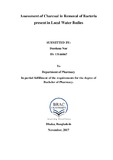Assessment of charcoal in removal of bacteria present in local water bodies
Abstract
Benjamin Franklin said “When the well’s dry, we know the worth of water”. One of the crying needs in Bangladesh, especially in Dhaka city is clean water. Massive urbanization and industrialization around Dhaka has adapted a much unplanned progress that led it to facing clean water crisis. The banks of rivers and large water bodies of Dhaka are engraved under stacks of wastes. Zero investment by industries on waste water management has contaminated the rivers running over the heart of Dhaka. Moreover, the water bodies around Dhaka city, such as Gulshan Lake, have been contaminated with household and sanitary wastes. As a consequence, the locality that grew around the banks of these water bodies are deprived of clean water. The underground water has greatly withdrawn the standard that is required to meet the clean water requirements. With the complexity of the water contamination, water purification has become complex too. The contaminants are increasing exploiting different varieties making water purification an expensive mechanism. The sufferers are mostly the localities living under poverty line. Not only that they are deprived of clean water but also as they are residing beside these water bodies, they are highly exposed to water borne diseases too. Water purification that is easy and economical can reduce this dearth of clean water. Water filtration is one of the mechanisms that are frequently used. Using material that has adherent properties can be used as a good water purifier. Charcoal is one such material that has phenomenal adherent property. The dictionary meaning of charcoal is porous black solid, consisting of an amorphous form of carbon, obtained as a residue when wood, bone, or other organic matter is heated in the absence of air. Charcoal is extensively used today as it has an excellent adherent property. For the purpose of separation of unusable, inconvenient and injurious particles Activated Charcoal has profound benefit. There are many sources of Charcoal. Considering the domiciliary prospectus of Bangladesh, the dried tree parts and woods are the primary source of fuel wood. The residue after exhaustion of these fuel woods is perceived as the charcoal. The objective of this study is to evaluate the antibacterial property laid out through the adherent property of the charcoal. The study has been done on water samples collected from water bodies available in Dhaka. Following the study, the aspiration is to widespread the use of Charcoal around the locality of Dhaka who are living under poverty line and are unable to afford pure water.

